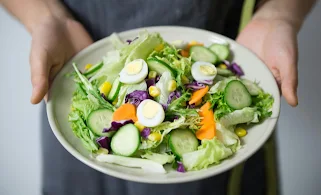Low Calorie Foods
- Vegetables: Such as arugula (5 calories per cup), asparagus (27 calories per cup), and beets (34 calories per 80g).
- Fruits: Like apples (62 calories per cup of slices) and berries, which are generally low in calories and high in fiber.
- Proteins: Foods like cod, eggs, and low-fat cottage cheese are low in calories but high in protein, which can help you feel full.
- Leafy Greens: Salad greens, spinach, and kale are very low in calories and can be used to make a voluminous, nutrient-rich salad3.
- Whole Grains: Options like whole grain toast can be a part of a low-calorie diet, providing fiber and essential nutrients.
- Dairy: Greek yogurt and low-fat dairy products offer protein and calcium with fewer calories.
Top 10 Low Calorie & Healthy Food
Certainly! Here are some low-calorie foods that you can incorporate into your diet for weight loss or simply to maintain a healthy lifestyle:
- Apples: A cup of apple slices provides only 62 calories and is rich in fiber, vitamin C, and potassium1.
- Arugula: This dark leafy green has a peppery flavor and contains only 5 calories per cup. It’s also a good source of vitamin K, folate, calcium, and potassium1.
- Asparagus: With just 38 calories per cup, cooked asparagus is rich in vitamin K and folate1.
- Beets: These colorful root vegetables provide nutrients like folate and manganese, along with heart-healthy compounds1.
- Strawberries: A cup of strawberries has 53 calories and is packed with vitamin C and antioxidants1.
- Vegetable Soup: A cup of vegetable soup contains 67 calories and is a great way to stay hydrated while getting essential nutrients2.
- Whole Grain Toast: One slice of whole grain toast provides 69 calories and is a good source of fiber2.
- Cod: A 3-ounce fillet of cod has 71 calories and is a lean protein option2.
- Eggs: A large egg contains 78 calories and is rich in protein and essential nutrients2.
- Low-Fat Cottage Cheese: An ounce of low-fat cottage cheese provides 81 calories and is a good source of protein and calcium2.
Remember, incorporating a variety of low-calorie foods into your meals can help you achieve your health goals. Enjoy these nutritious options!
Side Effects of Low Calorie Foods
While low-calorie foods can be beneficial for weight management and overall health, consuming too few calories can lead to several side effects. Here are some potential risks associated with a very low-calorie diet:
- Nutritional Deficiencies: Eating too few calories can result in not getting enough essential nutrients, leading to deficiencies1.
- Metabolic Slowdown: A significant calorie deficit can cause your metabolism to slow down, making it harder to lose weight in the long term2.
- Fatigue and Weakness: Not consuming enough calories can lead to feelings of fatigue and general weakness1.
- Mood Changes and Mental Health: Caloric restriction can affect your mood and may contribute to symptoms of depression or anxiety3.
- Hunger and Cravings: A low-calorie diet can increase feelings of hunger and lead to strong cravings for food3.
- Digestive Issues: Some people may experience digestive problems such as constipation or diarrhea when on a low-calorie diet4.
- Muscle Mass Loss: Consuming too few calories, especially when combined with a lack of protein, can lead to muscle loss2.
It’s important to approach weight loss and dieting in a balanced way, ensuring you get all the necessary nutrients while maintaining a calorie deficit that’s appropriate for your body and lifestyle. If you’re considering a low-calorie diet, it’s best to consult with a healthcare professional or a registered dietitian to create a plan that’s safe and effective for you.
Best Way to Eat Low Calorie Food
The best way to eat low-calorie foods is to focus on a balanced diet that includes a variety of nutrient-dense foods. Here are some tips to help you enjoy low-calorie foods in a healthy and satisfying way:
- Incorporate Protein: Include lean protein sources like chicken, fish, tofu, or beans. Protein helps you feel full and satisfied1.
- Add Volume with Vegetables: Fill up your plate with lots of vegetables. They’re low in calories but high in fiber and nutrients1.
- Choose Whole Grains: Opt for whole grains like oats, quinoa, or brown rice. They provide fiber and keep you feeling full longer1.
- Stay Hydrated: Drink plenty of water throughout the day. Sometimes thirst can be mistaken for hunger1.
- Eat Mindfully: Take your time to eat and enjoy your food. This can help you recognize when you’re full and prevent overeating2.
- Plan Your Meals: Prepare your meals ahead of time to ensure you have healthy, low-calorie options available2.
- Snack Wisely: Choose snacks that are high in protein and fiber to keep hunger at bay between meals1.
- Limit Added Sugars: Avoid foods with a lot of added sugars, which can add calories without nutrients2.
- Cook at Home: When you prepare your own meals, you can control the ingredients and portion sizes2.
- Enjoy Your Food: Don’t forget to include foods you love. Deprivation can lead to cravings and binge eating2.
Remember, the key is to create a diet that is sustainable and enjoyable for you while providing the nutrients your body needs.
 Reviewed by Food World
on
April 20, 2024
Rating:
Reviewed by Food World
on
April 20, 2024
Rating:






No comments: